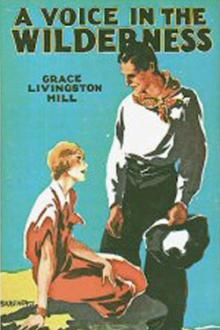A Voice in the Wilderness by Grace Livingston Hill (best short books to read .TXT) 📕

- Author: Grace Livingston Hill
- Performer: -
Book online «A Voice in the Wilderness by Grace Livingston Hill (best short books to read .TXT) 📕». Author Grace Livingston Hill
It was marvelous how these men liked their presents; and while they were examining them and laughing about them and putting their pictures and Mom Wallis's text on the walls, and the pillow on a bunk, and the pennant over the fireplace, Margaret shyly held out a tiny box to Gardley.
"I thought perhaps you would let me give you this," she said. "It isn't much; it isn't even new, and it has some marks in it; but I thought it might help with your new undertaking."
Gardley took it with a lighting of his face and opened the box. In it was a little, soft, leather-bound Testament, showing the marks of usage, yet not worn. It was a tiny thing, very thin, easily fitting in a vest-pocket, and not a burden to carry. He took the little book in his hand, removed the silken rubber band that bound it, and turned the leaves reverently in his fingers, noting that there were pencil-marks here and there. His face was all emotion as he looked up at the giver.
"I thank you," he said, in a low tone, glancing about to see that no one was noticing them. "I shall prize it greatly. It surely will help. I will read it every day. Was that what you wanted? And I will carry it with me always."
His voice was very earnest, and he looked at her as though she had given him a fortune. With another glance about at the preoccupied room—even Bud was busy studying Jasper Kemp's oldest gun—he snapped the band on the book again and put it carefully in his inner breast-pocket. The book would henceforth travel next his heart and be his guide. She thought he meant her to understand that, as he put out his hand unobtrusively and pressed her fingers gently with a quick, low "Thank you!"
Then Mom Wallis's bonnet was brought out and tied on her, and the poor old woman blushed like a girl when she stood with meek hands folded at her waist and looked primly about on the family for their approval at Margaret's request. But that was nothing to the way she stared when Margaret got out the threefold mirror and showed her herself in the new headgear. She trotted away at last, the wonderful bonnet in one hand, the box in the other, a look of awe on her face, and Margaret heard her murmur as she put it away: "Glory! Me! Glory!"
Then Margaret had to read one or two of the poems for Jasper Kemp, while they all sat and listened to her Scotch and marveled at her. A woman like that condescending to come to visit them!
She gave a lesson in note-reading to the Fiddling Boss, pointing one by one with her white fingers to the notes until he was able to creep along and pick out "Suwanee River" and "Old Folks at Home" to the intense delight of the audience.
Margaret never knew just how it was that she came to be telling the men a story, one she had read not long before in a magazine, a story with a thrilling national interest and a keen personal touch that searched the hearts of men; but they listened as they had never listened to anything in their lives before.
And then there was singing, more singing, until it bade fair to be morning before they slept, and the little teacher was weary indeed when she lay down on the cot in Mom Wallis's room, after having knelt beside the old woman and prayed.
The next day there was a wonderful ride with Gardley and Bud to the cañon of the cave-dwellers, and a coming home to the apple dumplings she had taught Mom Wallis to make before she went away. All day Gardley and she, with Bud for delighted audience, had talked over the play she was getting up at the school, Gardley suggesting about costumes and tree boughs for scenery, and promising to help in any way she wanted. Then after supper there were jokes and songs around the big fire, and some popcorn one of the men had gone a long ride that day to get. They called for another story, too, and it was forthcoming.
It was Sunday morning after breakfast, however, that Margaret suddenly wondered how she was going to make the day helpful and different from the other days.
She stood for a moment looking out of the clear little window thoughtfully, with just the shadow of a sigh on her lips, and as she turned back to the room she met Gardley's questioning glance.
"Are you homesick?" he asked, with a sorry smile. "This must all be very different from what you are accustomed to."
"Oh no, it isn't that." She smiled, brightly. "I'm not a baby for home, but I do get a bit homesick about church-time. Sunday is such a strange day to me without a service."
"Why not have one, then?" he suggested, eagerly. "We can sing and—you could—do the rest!"
Her eyes lighted at the suggestion, and she cast a quick glance at the men. Would they stand for that sort of thing?
Gardley followed her glance and caught her meaning. "Let them answer for themselves," he said quickly in a low tone, and then, raising his voice: "Speak up, men. Do you want to have church? Miss Earle here is homesick for a service, and I suggest that we have one, and she conduct it."
"Sure!" said Jasper Kemp, his face lighting. "I'll miss my guess if she can't do better than the parson we had last Sunday. Get into your seats, boys; we're goin' to church."
Margaret's face was a study of embarrassment and delight as she saw the alacrity with which the men moved to get ready for "church." Her quick brain turned over the possibility of what she could read or say to help this strange congregation thus suddenly thrust upon her.
It was a testimony to her upbringing by a father whose great business of life was to preach the gospel that she never thought once of hesitating or declining the opportunity, but welcomed it as an opportunity, and only deprecated her unreadiness for the work.
The men stirred about, donned their coats, furtively brushing their hair, and Long Bill insisted that Mom Wallis put on her new bonnet; which she obligingly did, and sat down carefully in the barrel-chair, her hands neatly crossed in her lap, supremely happy. It really was wonderful what a difference that bonnet made in Mom Wallis.
Gardley arranged a comfortable seat for Margaret at the table and put in front of her one of the hymn-books she had brought. Then, after she was seated, he took the chair beside her and brought out the little Testament from his breast-pocket, gravely laying it on the hymn-book.
Margaret met his eyes with a look of quick appreciation. It was wonderful the way these two were growing to understand each other. It gave the girl a thrill of wonder and delight to have him do this simple little thing for her, and the smile that passed between them was beautiful to see. Long Bill turned away his head and looked out of the window with an improvised sneeze to excuse the sudden mist that came into his eyes.
Margaret chose "My Faith looks up to Thee" for the first hymn, because Fiddling Boss could play it, and while he was tuning up his fiddle she hastily wrote out two more copies of the words. And so the queer service started with a quaver of the old fiddle and the clear, sweet voices of Margaret and Gardley leading off, while the men growled on their way behind, and Mom Wallis, in her new gray bonnet, with her hair all fluffed softly gray under it, sat with eyes shining like a girl's.
So absorbed in the song were they all that they failed to hear the sound of a horse coming into the clearing. But just as the last words of the final verse died away the door of the bunk-house swung open, and there in the doorway stood Pop Wallis!
The men sprang to their feet with one accord, ominous frowns on their brows, and poor old Mom Wallis sat petrified where she was, the smile of relaxation frozen on her face, a look of fear growing in her tired old eyes.
Now Pop Wallis, through an unusual combination of circumstances, had been for some hours without liquor and was comparatively sober. He stood for a moment staring amazedly at the group around his fireside. Perhaps because he had been so long without his usual stimulant his mind was weakened and things appeared as a strange vision to him. At any rate, he stood and stared, and as he looked from one to another of the men, at the beautiful stranger, and across to the strangely unfamiliar face of his wife in her new bonnet, his eyes took on a frightened look. He slowly took his hand from the door-frame and passed it over his eyes, then looked again, from one to another, and back to his glorified wife.
Margaret had half risen at her end of the table, and Gardley stood beside her as if to reassure her; but Pop Wallis was not looking at any of them any more. His eyes were on his wife. He passed his hand once more over his eyes and took one step gropingly into the room, a hand reached out in front of him, as if he were not sure but he might run into something on the way, the other hand on his forehead, a dazed look in his face.
"Why, Mom—that ain't really—you, now, is it?" he said, in a gentle, insinuating voice like one long unaccustomed making a hasty prayer.
The tone made a swift change in the old woman. She gripped her bony hands tight and a look of beatific joy came into her wrinkled face.
"Yes, it's really me, Pop!" she said, with a kind of triumphant ring to her voice.
"But—but—you're right here, ain't you? You ain't dead, an'—an'—gone to—gl-oo-ry, be you? You're right here?"
"Yes, I'm right here, Pop. I ain't dead! Pop—glory's come to me!"
"Glory?" repeated the man, dazedly. "Glory?" And he gazed around the room and took in the new curtains, the pictures on the wall, the cushions and chairs, and the bright, shining windows. "You don't mean it's heav'n, do you, Mom? 'Cause I better go back—I don't belong in heav'n. Why, Mom, it can't be glory, 'cause it's the same old bunk-house outside, anyhow."
"Yes, it's the same old bunk-house, and it ain't heaven, but it's goin' to be. The glory's come all right. You sit down, Pop; we're goin' to have church, and this is my new bonnet. She brang it. This is the new school-teacher, Miss Earle, and she's goin' to have church. She





Comments (0)